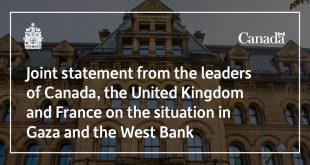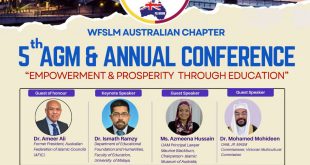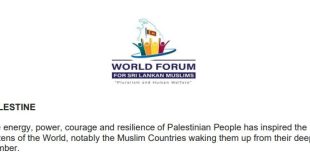Good afternoon! It is a real honour to participate and speak at this book launch, to join the distinguished speakers and all who are present here. I thank the organisers for inviting me, especially Shreen Saroor and Yamini Ravindran for enabling my participation today.
I want to begin by congratulating the authors of this excellent and much needed book, Muslims in Post-War Sri Lanka: Repression, Resistance and Reform.
It is full of insights, critical analysis, and written in very accessible language and form. Some of the pages are heart-breaking to read, but at the same time inspiring as it documents not just the trials and tribulations of the Muslim communities in Sri Lanka, but it is also a candid diagnosis of complex challenges that points to solution—at least to some of the problems, and certainly to human rights defenders in Sri Lanka and their collaborators everywhere.
I will not speak about the book much more—the book speaks for itself and it is an essential read for everyone. But I do want to speak to the context of the book, especially as seen from my perspective as the UN Special Rapporteur on freedom of religion or belief, and one who had made a formal visit to Sri Lanka in that capacity.
I want to therefore use this opportunity to acknowledge the continued efforts by international and Sri Lankan civil society and human rights activists, through their reports and advocacy initiatives, to keep abreast the international community of the human rights situation in the country.
This is a situation, that is characterized by regressive steps, in a number of areas, including the rule of law and the respect for independent institutions; restrictions in the enjoyment of human rights; persistent incitement to hatred and violence against certain communities; and entrenched impunity and lack of progress in the transitional justice process.
In the post-war period,international community, has worked with Sri Lanka to promote national including through capacity-building, as well as through mechanisms to support the transitional justice process, such as the 2015 investigation of the UN High Commissioner on Human Rights into alleged serious human rights violations and related crimes during the period covered by the Lessons Learnt and Reconciliation Commission (LLRC).
However, as the UN High Commissioner for Human Rights stated in February this year, successive Government commissions not only have failed to credibly establish truth and ensure accountability, but they have also obstructed investigations and judicial proceedings on a number of human rights cases.
Little progress has been made with regard to the establishment of the truth and reconciliation commission and the special judicial mechanisms, and there are still many questions around the status and operation of the Office on Missing Persons and the Office for Reparations.
The 2019 Easter bombings were followed by a significant rise in inter-communal tension, specifically targeting members of certain religious minorities and their places of worship, in particular Muslims; a community that has been for many years stigmatized and its existence portrayed by media, religious and political leaders, as a threat to national cohesion and security.
My mandate has been closely following and reporting on the human rights situation of religious minorities in the country, and it has repeatedly called on the Government to take all appropriate measures to curb incitement to hatred and violence against members of minorities and to put an end to securitization of ethno-religious differences for political ends.
During my 2019 visit, I noted with concern that the transitional period, following the lengthy conflict has been marked by simmering tensions, perpetuating a sense of insecurity, with legal and institutional settings that offer majoritarian privilege and undermine the equal protection of the law for minorities.
I had recommended that the Government step up its efforts to ensure accountability for past and current violations; to dismantle the networks of hate; to ensure equal access to justice for all, without discrimination; to repeal the Prevention of Terrorism Act and revise the provisions of the Penal Code that relate to various offences on religion-related matters; to take appropriate steps to ensure that political and religious leaders understand their responsible roles in combatting hateful narratives and in fostering inter-communal trust and dialogue; to undertake educational initiatives to promote understanding, tolerance, gender equality and friendship among communities.
However, the Government’s withdrawal, in February 2020, from the HRC Resolution 30/1 process is not an encouraging development towards an inclusive and thorough reconciliation and accountability process.
Another worrying trend is the shrinking civic space and the increasing surveillance and scrutiny of civil society organisations, victims’ groups and human rights defenders, in particular those advocating for the rights of persons belonging to minorities. The HC’s recent report has indicated that since the 2019 Easter attacks, dozens of organizations working on documentation or litigation around accountability and disappearances issues were visited by security agents, and their members being often summoned by the police for questioning on their activities.
The COVID-19 outbreak has led to further regression in human rights. It has also led to the imposition of compulsory cremation, disregarding the cultural and religious traditions and practices of certain communities, in particular Muslims, when there has been no established medical or scientific evidence that the burial of dead bodies could lead to increased risk of spreading COVID-19.
Counter-terrorism laws have been often used to suppress and criminalize dissenting views and criticism of the Government’s policies, and have led to the arbitrary arrest and detention of hundreds of individuals, most of whom are members of ethno-religious minorities and minority human rights defenders and lawyers.
Heejaz Omer Hizbullah, a prominent lawyer advocating against the rising hate speech and violence targeting Muslims Sri Lanka, as been detained since April 2020, persecuted on vague terrorism allegations, aiming at intimidating him for his human rights work and the practice of his legal profession. He is being held for over a year without officially being charged. In the meantime the allegations appear to have changed focus linking him with an alleged misconduct concerning an education charity he was leading.
At the same time, little has been done to investigate and prosecute individuals, including members of police and security forces, for past violations, such as torture, enforced disappearances and extrajudicial killings, as well as to undertake the appropriate measures to prevent their recurrence. The appointment to senior command of military officers whose troops under their command had committed gross violations during the war, and the control of the judiciary by the executive branch and the unfettered discretion of the President to appoint all judges of the superior courts, as per the 20th Amendment to the Constitution are just few examples of how the Sri Lankan authorities appear to understand the meaning of accountability, justice and national healing process.
Of particular concern is the recent adoption of the Regulations on “de-radicalisation from holding violent extremist religious ideology” of 2021, which expand upon provisions of the PTA, and which contradict Sri Lanka’s international human rights obligations. In August 2021, my mandate along with other UN experts wrote to the Government raising concerns about these Regulations, the violations of the rights to freedom of expression, religion or belief, and violations of due process and of guarantees against arbitrary detention by the imposition of mandatory “rehabilitation” without trial for all those suspected of causing or intending to cause “violence on racial, religious or communal disharmony”.
In addition, more needs to be done with regard to the rights of women and girls, and the Government needs to proceed with an effective follow-up to the National Human Rights Action Plan of 2017-2021, which contained a separate chapter on women’s rights, and to the Policy Framework and National Plan of Action to address Sexual and Gender-Based Violence of 2016-2020.
In this context, I have always reiterated that religion should never be an impediment to the enjoyment of all human rights by any person, irrespective of gender, gender identity or sexual orientation.
We need to keep in mind that the protection of certain ethnic or religious communities against discrimination or violence doesn’t mean an automatic approval of any communitarian practice or belief that may violate the rights of certain individuals within the said communities. Much of my work globally has focused on addressing multiple forms of discrimination or intersectionality—about additional disadvantages suffered by minorities within minorities. Women and girls in religious communities are often in this situation. Religious beliefs or cultural traditions should never be invoked to justify human rights violations against women and girls, as well as against LGBTQ persons.
I said there were very promising elements in this book—and among things that struck me most is the intersectional analysis offered by two others, Nabeela Iqbal and Ameer Faiz, with regard to the experiences of Muslim women, and the prospect of meaningful reform to the Muslim Marriage and Divorce Act. The reform proposals come at time when there is also heightened international attention on the role of women in fostering peace security, and the delivery of the Sustainable Development Goals which pledges to leave no one behind. I understand the Cabinet has approved a full reform of the Muslim Marriage and Divorce Act in April this year.
The proposed reforms include better access to justice for Muslim women and protections against what Professor Frances Raday calls harmful practices and lesser infringments. This is an important moment, that comes after our 60 years of struggle to reform MMDA and the male only quazi system and other infringments of Muslim women’s rights, and this opportunity must not be squandered. I call upon Muslim leaders and politicians to support the reform of the MMDA, to recognise that women have an equal right to freedom of religion or belief as do men.
I further join the UN Committee on the Elimination of All Forms of Discrimination against Women by calling on the Government of Sri Lanka to amend all personal laws, including the Muslim, Kandyan and Tesawalamai Personal Laws, and to remove all discriminatory provisions affecting women and girls.
I want to conclude by commending the work of the vibrant Sri Lankan civil society and their proven capabilities to accurately monitor and report on the human rights situation in the country. I encourage them to continue to do so, including working with the global human rights movement and mechanisms.
And lastly, I want to thank the authors, editors, publishers and other contributors of the book for producing such and excellent volume, Muslims in Post-War Sri Lanka.
*Dr. Ahmed Shaheed – the UN Special Rapporteur on Freedom of Religion or Belief
Disclaimer :
Views expressed by writers in this section are their own and do not necessarily reflect World Forum for Sri Lankan Muslims (wfslm.org) point-of-view.
 World Forum for Sri Lankan Muslims Sri Lanka Muslims Forum
World Forum for Sri Lankan Muslims Sri Lanka Muslims Forum


